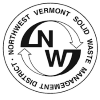Zero Waste is the philosophy and practice of eliminating waste from one’s lifestyle. Zero Waste challenges our consumption and disposal practices by encouraging people to live in a way that produces as little trash as possible. Instead of promoting a linear system of consumption (where things are made, then disposed of), the zero waste philosophy adheres to a circular system, mimicking cyclical processes found in nature, in which nothing is wasted and every resource is recycled.
Zero Waste

The 5 R's of Zero Waste
Refuse: Avoid unnecessary waste. Say no to things you don’t need like straws or plastic utensils. Carry items by hand whenever possible instead of taking a disposable bag. Sign up for paperless billing whenever possible.
Reduce: Avoid unnecessary purchases. Plan meals to avoid food waste, purchase products with limited or no packaging, limit impulse purchases. Reuse: Eliminate single-use items! Use reusable bags, eating utensils, plates, food storage containers, and water bottles. Buy secondhand whenever possible. Donate old items instead of throwing them away. Recycle: Opt for reuse whenever possible instead of recycling. For items that cannot be reused, check NWSWD’s A-Z guide to determine your recycling options. Rot (Compost): Compost! Food, yard waste, and other organic material can be composted in backyard piles or bins. If space is limited, consider a worm bin for your food scraps, or utilize one of NWSWD’s food scrap drop off sites located across Franklin County.The Reality of Zero Waste
While individual lifestyle changes can lead to substantial change, it’s important to note that we all live and operate within a linear system. Zero Waste is a concept, something to strive for. It is impossible to truly achieve Zero Waste as long as the greater system promotes, and often requires, overconsumption and unsustainable disposal practices. Recognizing the flaws within our socioeconomic and waste management systems is a crucial component to building a sustainable future. Adopting Zero Waste practices is one method of reducing our individual impacts while contributing to a multi-pronged approach of addressing systemic flaws and building a brighter, more-livable future.

